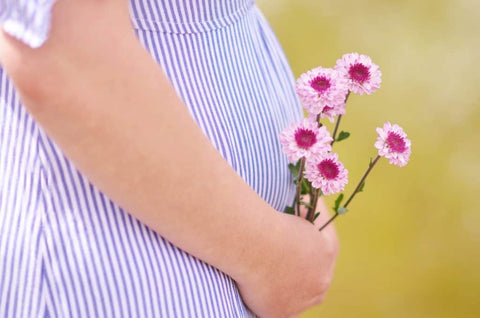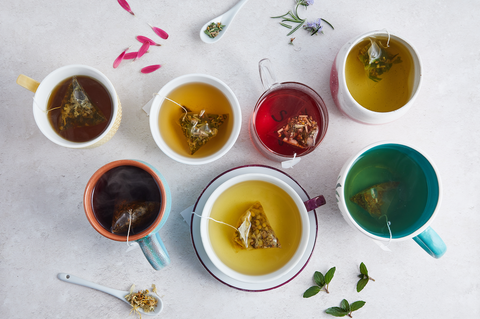HERBAL TEAS WHEN PREGNANT AND BREASTFEEDING
You are pregnant and can’t survive the day without a cuppa or two? Perhaps You are breastfeeding and keen to give your supply a little boost? You are also most likely asking yourself which teas are safe to drink during pregnancy and breastfeeding.
As these two stages of mamahood are very different, and our body has different demands in each stage. So are the recommended herbs that can support you.
The First Stage Pregnancy
Let’s have a look at pregnancy as the first stage in our journey to becoming a mother.
Regardless if you are an English Breakfast type of mama to be or a herbal tea fan, you will want to understand what is best to drink and what is best to avoid.
Before anything please have in mind – In pregnancy, probably more than ever, the rule of moderation is king. Keep a balanced mind and approach with your healthy diet. 2-3 cups of herbal teas that are generally recognised as safe can be a wonderful addition to your healthy pregnancy lifestyle so don’t exaggerate with the amount of teas while expecting.
Herbal Teas Generally Known as Safe in Pregnancy
Many mums will steer away from caffeine throughout pregnancy and naturally, caffeine-free herbal infusions are a perfect solution. There are many teas recognised as safe in pregnancy, if not drunk in excessive amounts.
This is the list of 5 safe most well-known herbal and fruit infusions for pregnant mamas:
-
Peppermint & Spearmint
These two just might become your herbal tea favourites. Safe from the early stages of pregnancy, they are not only refreshing in taste but can help to relax the stomach muscles and settle an upset stomach. They are traditionally used to aid nausea in early pregnancy, a symptom many of us mamas will experience.
Both of these herbs are safe to be drunk alone or in tea blends throughout pregnancy. My personal favourite for pregnancy blends and one I would always happily recommend to any expecting mother.
-
Rooibos
Generally known as safe in pregnancy, this naturally caffeine-free tea will likely appeal to traditional black tea drinkers. It can be drunk from the early stages of pregnancy, although some mums don’t find the taste appealing in the first trimester. Rooibos is also known for its positive effects on digestion. It is safe for children so feel free to enjoy with the whole family. You can drink it with or without milk and with a dash of honey for a special treat.
-
Ginger
Popular in pregnancy and widely used by expecting mamas this wonderful root is safe in moderation. This warming herb is known as the anti-nausea natural remedy and can relieve stomach issues related to pregnancy. There has been limited research, showing doses over 1500mg should be avoided in pregnancy, so avoid excessive consumption. A cuppa or two is absolutely fine, and even better if blended with other beneficial herbs. The research on benefits in pregnancy with the anti-nausea effect is substantial so give it a try if fighting morning sickness.
-
Raspberry Leaf
Probably most well- known herb for use in pregnancy, this naturally caffeine-free herbal tea is traditionally drunk as a ‘tonic for uterus’. It is believed raspberry leaf can help and tone the walls of the womb and help mums prepare for labour. On the contrary to belief, there is no significant research to confirm that it can induce labour, but for precaution, in the UK, it is still traditionally recommended to be drunk from the second trimester if prepared as a pure raspberry leaf.
You can start with one cup at 26 weeks, build up to 2 cups at 32 weeks, and 3-4 cups from 37 weeks, if it feels right for you.
You can start drinking herbal blends containing raspberry leaf earlier, start with 1 cup and build gradually. Don’t overdo it in your last trimester thinking it will induce labour, excessive consumption is not proved beneficial or safe.
-
Fruit teas (fruit infusions)
apples, oranges, lemons, strawberries, raspberries can all make wonderful fruit infusions and be drunk safely hot or cold. Fruit teas containing common fruits are generally known as safe. Have a look at the ingredients list if you are buying a ready-made fruit infusion as it will sometimes be blended with herbs and very often liquorice, which you might want to avoid in pregnancy.
Whatever your favourite go-to tea in pregnancy is, choose organic. This is the time when you will want to avoid the toxins present in pesticides and organic is the best choice for your and babies health. I have created my Award- Winning Organic Happy Bumps, to balance all the requirements to make any bump happy and with safety in mind. It is a minty refreshing herbal infusion that is designed to be drunk safely throughout pregnancy (with 13{f41d67af321b2f880fc2ae4357fea308e239324b184707ab9ece8126390c4d0a} raspberry leaf).
Regarding classic black teas, you can enjoy in moderation as well, but just have in mind that they do have caffeine so you might want to limit their intake. 1 cup of standard English Breakfast will have around 40-70 mg of caffeine.
What To Avoid In Pregnancy
Some teas are best avoided during pregnancy, as there has been some controversial research about their safety. Although often not conclusive, until there is more data on their safety it is best to avoid in your 9 months of bliss:
- St John’s Wort and Yarrow
- Lemongrass – amounts used as spice in culinary dishes are safe, but supplements and lemongrass tea should be avoided during pregnancy
- Liquorice root – often used in teas to add to sweetness it is best avoided in pregnancy as excessive consumption can cause high blood pressure and worsen preeclampsia.
- Ginseng
Teas containing caffeine that you might want to limit- matcha, oolong, yerba mate, green tea, Assam, Ceylon (black tea in general).
Although this list is not exhaustive, it will give you an overview of most commonly consumed teas and herbal infusions.
This takes us to the next stage –
BREASTFEEDING
Often unexpectedly challenging, breastfeeding is no doubt the best form of nourishment you can provide for your little one. One of the biggest concerns mums face in those early days is milk supply. Below I will cover herbs that are traditionally used to support nursing mothers, not just to boost their milk supply but to support the hormonal balance, immune system and provide a healthy form of hydration that is naturally caffeine free. Because yes, when breastfeeding you will want to limit your caffeine intake as well. Have in mind that some of the herbs recommended in pregnancy are uterine stimulates, so don’t assume they are suitable for pregnancy.
Fennel
has a long-standing tradition as a galactagogue herb. It is believed to promote good milk flow in nursing mums. Seeds from this Mediterranean plant also have a soothing effect on digestion which can help babies suffering from colic and trapped wind.
Aniseed
also commonly used in breastfeeding herbal infusions for its traditional use to support lactation in nursing mothers. With similar properties to fennel, it is also widely used in anti-colic herbal infusions. Do not mistake it for star anise. This is not advised to be used when breastfeeding nor to be given to infants.
Fenugreek
very common ingredient of breastfeeding teas and supplements for its popularity among breastfeeding mothers and a number of reports on positive effect on breastmilk supply. Although most relevant research is in relation to support of the immune system, good enough to include it in my own breastfeeding blend Organic Mum’s Milk.
Moringa
Also known as the miracle tree, it’s leaves can be prepared as tea, or often found on market as a powder, they are used for centuries to boost milk supply in nursing mothers. With so many health benefits, even if your supply is established you might want to consider adding a bit of moringa in your breastfeeding diet. It is rich in vitamins A, E, K and minerals including iron and calcium, so important in our postpartum life.
Caraway
with appearance and taste that resemble to well know cumin, caraway has traditionally been used to aid milk supply for their property to stimulate lactation in nursing women. It is also often used in anti-colic remedies so drinking it will have a beneficial effect on babies’ stomach.
Goat’s Rue
one of the amazing herbs with galactagogue properties, that is maybe not as widely known. It earned its name because firstly farmers used it to increase milk supply in their livestock (goats’). It should never be taken as a fresh herb or to be mistaken by Rue. If in doubt ask about Latin name which should be Galega Officinalis
If working on your milk supply, limit Intake of peppermint, sage and oregano as they are known to lower it. Again, have in mind a cup of peppermint tea or using sage in culinary dishes certainly won’t impact how much milk you produce. So, relax, feed when baby wants to, stay hydrated and seek for support if you are concerned about your supply. Correct positioning, latch and often feeding (on demand) are most important for good milky supply. Furthermore herbs can be a wonderful and natural addition on your breastfeeding journey.
Please speak to your doctor, midwife and your herbalist if you have any concerns about any of the teas or herbs. Listen to your body and remember to stay moderate, sip, enjoy and relax. You’ve got this mama!
Marina, MSc Medicinal Plants, Mum of Two & founder of Nipper&Co



